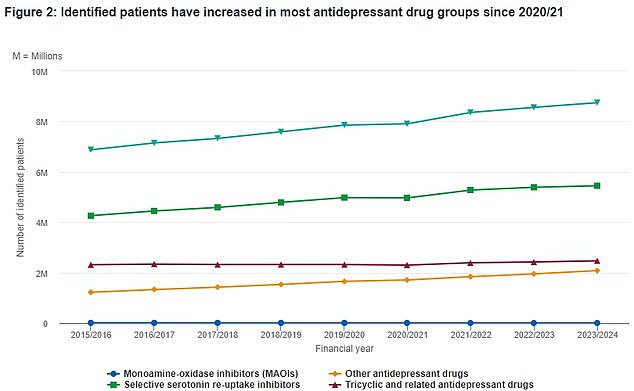British scientists discover way to predict who is most at risk of depression in major mental health breakthrough – new drug treatments now possible
Scientists have discovered a way to predict who is most at risk of depression, according to groundbreaking new research.
The world’s leading experts have found nearly 300 genetic variants linked to the condition, previously unknown to scientists.
They join more than 400 genetic links previously found to increase the risk of depression, meaning the number of DNA patterns thought to cause the condition has almost doubled.
Scientists, who have followed more than 5 million adults worldwide, say the British-led study offers more hope than ever before that the mental illness can be tackled with new drugs that target the specific genetic variations.
Experts added that this could be done through already available medications, such as those used to treat chronic pain.
Study co-leader Professor Cathryn Lewis, from the Institute of Psychiatry, Psychology and Neuroscience at King’s College London, said: ‘Depression is a common condition and we still have a lot to learn about its biological underpinnings.
‘Our study identifies hundreds of additional genetic variants that play a role in depression.
‘These findings open ways to translate these findings into better care for people with depression.’
The world’s leading experts have found nearly 300 unknown genetic variants linked to the condition. They join more than 400 genetic links that experts have previously found increase a person’s risk of suffering from depression
Study co-leader Professor Andrew McIntosh, from the University of Edinburgh’s Center for Clinical Brain Sciences, added: ‘There are huge gaps in our understanding of clinical depression that limit the ability to improve outcomes for those affected. improve.’
The latest survey figures from the Office for National Statistics show that one in six Britons report moderate or severe depressive symptoms – 60 percent more than the previous three years.
This skyrocketing increase has been variously attributed to mounting mental pressure due to Covid lockdowns and the subsequent cost of living crisis.
Separate data also shows that around 8.6 million people in England were taking an antidepressant in 2022/23 – almost a fifth of all adults.
More than half of those taking antidepressants in England have been taking them for at least a year.
In the study, researchers from the University of Edinburgh and King’s College London tracked genetic data from more than 5 million adults in 29 countries.
They found a total of 697 genetic variants linked to depression – almost half of which had never before been linked to the condition.

This NHS data shows how many Britons have taken each type of antidepressant over the past eight years. The line with the green triangles indicates the total number of patients

Researchers said the findings offered new insight into possible new treatments for depression. One of them – Pregabalin, sold under the brand names Lyrica, Alzain and Axalid – could be reused
Of these, 100 were identified because the study included people of African, East Asian, Latin American and South Asian descent, the scientists said.
Previously, studies mainly focused on European adults.
The identified genetic variants were linked to neurons in the brain, including in areas that control emotions.
Writing in the diary, Cellthe researchers said that the previously unknown genetic links to the condition would allow scientists to predict the risk of depression.
Each genetic variant has a very small effect on the overall risk of developing depression. However, if someone has multiple variants, these small effects can add up, increasing risk.
It also provided new insight into possible new treatments, she added.
These include existing medications Pregabalin, used for chronic pain, and Modafinil, used for narcolepsy, which are being repurposed to treat depression.
However, they cautioned that further studies and clinical trials would be needed first to investigate the drugs’ potential in patients with depression.
The UK medicines regulator, Medicines and Healthcare Products Regulatory Agency (MHRA), is currently reviewing 30 antidepressants, including citalopram, sertraline and mirtazapine, after families raised concerns about the loss of their loved ones.
Since 2014, the MRHA has received more than 71 alerts about fatalities linked to the antidepressant citalopram and 114 alerts about fatal side effects linked to sertraline.
Dr. Jana de Villiers, a spokesperson for the Royal College of Psychiatrists who was not involved in the research, said: ‘We welcome this research into the genetic variants that may predispose people to depression and its diversity in terms of global representation makes it special remarkable.
‘By improving our understanding of genetic risk factors and the causes of mental illness, we may be able to develop better treatment methods in the future.
‘The Board recognizes that developments in genomic medicine can improve clinical care for patients with mental illness, including depression.’
She added: ‘It is positive to see potential targets for the development of these new treatments being identified.
“We will continue to support ongoing efforts to prevent mental illness and improve outcomes for people affected by depression.”
